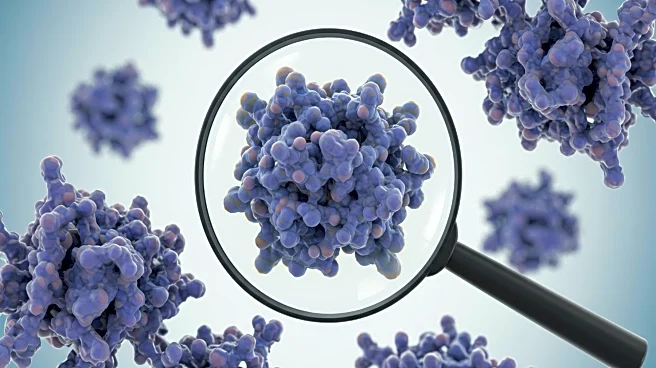What's Happening?
Researchers funded by Cancer Research UK have identified autophagy defects in pancreatic precancer cells in mice, leading to the accumulation of misfolded proteins. These findings, published in Developmental Cell, suggest a potential link between disrupted autophagy and the early stages of pancreatic cancer development. The study observed similar protein aggregates in human pancreatic tissue, indicating a shared process across species. The research highlights the role of autophagy disruption in the onset of pancreatic cancer, a disease known for its low survival rates and late diagnosis. The study also explores the interaction between KRAS gene mutations and autophagy defects, which may contribute to malignant transformation.
Why It's Important?
The discovery of autophagy defects in pancreatic precancer cells is crucial for understanding the mechanisms behind one of the deadliest cancers. By identifying the role of protein clumping in cancer initiation, researchers can explore new prevention strategies and therapeutic targets. This study bridges the gap between oncology and neurodegenerative diseases, suggesting that similar processes may underlie both conditions. The findings could lead to innovative approaches in cancer treatment, potentially improving early detection and intervention methods. Understanding the interplay between genetic mutations and cellular processes may pave the way for personalized medicine in cancer care.
What's Next?
Researchers plan to investigate whether the changes observed in pancreatic precancer cells can be predicted or reversed early on. Future studies will explore the influence of age, sex, and diet on the onset of these cellular changes. The team aims to develop strategies to prevent malignant transformation by targeting autophagy pathways. Continued research may reveal broader implications for cancer treatment, including the development of drugs that modulate autophagy. The study's findings could also inform research into other diseases characterized by protein aggregation, such as neurodegenerative disorders.
Beyond the Headlines
The study's findings suggest a surprising cross-disease connection between cancer and neurodegenerative disorders, both driven by protein aggregation. This link may open new avenues for research into prevention strategies that address common cellular dysfunctions. The ethical implications of targeting autophagy pathways in treatment must be considered, as these processes play complex roles in cellular health. Long-term shifts in cancer research may focus on the integration of insights from neurodegenerative disease studies, potentially leading to holistic approaches in disease management.









